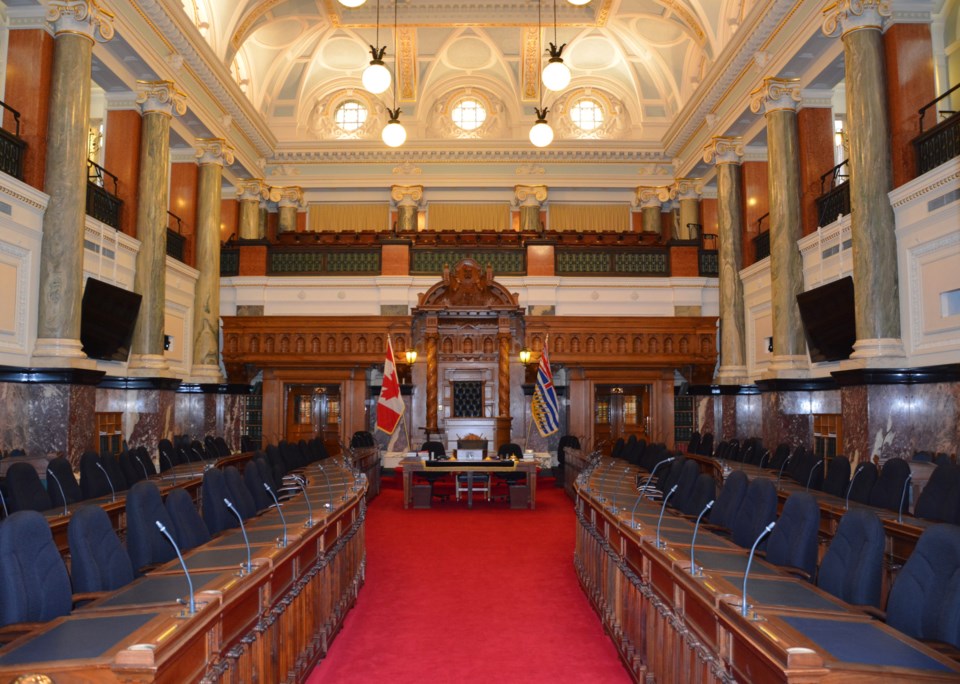What is BC politics without a debate about aspersions?
During a debate on Bill 7, an exchange between an opposition MLA and the Deputy Speaker led to an argument over decorum, fairness, and what’s allowed – and more to the point, not allowed – to be said in debate.
Bill 7, otherwise known as the Electoral Boundaries Commission Amendment Act, is contentious. If passed (it’s going to pass) it will direct the independent electoral boundaries commission to not only potentially increase the number of seats (it’s going to increase the number of seats), but remove the protection for underpopulated regions (it’s going to…you get it).
In all probability, it means more seats in the Lower Mainland, and less in the interior and north – which even a casual observer of BC politics will notice, appears to be good news for the NDP, and bad news for the BC Liberals.
Hence the contentiousness.
The BC Liberals’ last speaker, Columbia River-Revelstoke MLA Doug Clovechok, was wrapping up his speech, when he lamented the comparative lack of government MLAs participating in the bill debate. As his specific words became an issue, for context it’s worth repeating them verbatim here:
“And it's so disappointing for me as an MLA to see that more of the NDP members did not rise to speak to this bill, especially those from rural constituencies. I know these MLAs, but they didn't get up. They didn't represent their constituents. Now, whether they weren't allowed, I don't know. I don't have the answer for that. But I know that my constituents, if I did not rise to speak to this as a rural MLA, would have been incredibly disappointed and felt neglected, and it's a shame that we didn't see more on the other side rise to speak to this.”
At this, Deputy Speaker Spencer Chandra-Herbert (and NDP MLA for Vancouver-West End) intervened, asked Clovechok to not “cast aspersions” against other members. Clovechok brushed this aside, insisting he hadn’t done that, and carried on.
Here’s where it got interesting.
Chandra-Herbert once again demanded he withdraw the remarks; Clovechok refused, and Chandra-Herbert cut him off, ended his speech, and said he’d have to come back and withdraw them later, or “otherwise, we will have to take other steps, Member.”
“Other steps” likely refers to Standing Order 20, which enables the Speaker (or Chair, the role Chandra-Herbert was filling) to suspend members for refusing to take their direction:
Any Member who disregards the authority of the Chair or refuses to comply with an order of the Chair, or abuses the rules of the House by persistently and wilfully obstructing the business of the House, or otherwise, may be named by the Speaker or by the Chairperson of the Committee of the Whole.
MLAs can be dragged (literally) by the Sergeant-at-Arms to the Speaker’s Office to answer for this, and suspended for 30 sitting days.
So it’s quite clear: Clovechok – and indeed any MLA – is obligated to take direction from the chair. But was the direction fair, and intervention warranted?
Chandra-Herbert said “[Clovechok] did cast aspersions on other MLAs,” but reading the record, it’s difficult to say what the aspersions would be. There are many and various rules of debate – for example, members can’t refer to another by name, or say another specific MLA isn’t in the house at the time – but there’s nothing that says MLAs can’t express disappointment over a lack of participation in bill debate.
Speculating whether they were “allowed” to speak is arguably more borderline, but inarguably much worse things are said in the chamber every day, up to and including saying MLAs “don’t care” about certain groups and various tragedies, including deaths.
The next day, Speaker Raj Chouhan addressed the legislature. His full remarks are worth reading, but lengthy. He expressed disappointment that Clovechok didn’t follow the Chair’s direction, but ruled that Clovechok’s remarks may have been “immoderate” but did not fall under the category that requires immediate withdrawal. In other words, Chandra-Herbert overreached.
To make this whole affair even more confusing (and let’s just say it: amusing) Clovechok was later caught on Hansard audio “using an unparliamentary word” describing what had just happened to a colleague – which may have rhymed with “bullspit.” It got noticed, and Clovechok did have to withdraw that.
So: who was wrong here?
For his part, Clovechok at first refused to take Chandra-Herbert’s direction as Chair. Can’t do that; as Chouhan noted, it constitutes “gross misconduct.”
But Chandra-Herbert’s direction was, well, wrong. As Chouhan noted, “the member's comments were not inconsistent with remarks made on previous occasions, including remarks made by other members earlier in the same second reading debate.”
In other words, his words were fair game, and he was being singled out unfairly.
Was this an earth-shaking episode? Hardly. For three years, BC set the bar unfathomably high for Speaker-related stories. It does illustrate that towards the end of a long legislative session, fatigue sometimes leads to allegations of aspersions.
Allegedly.
Maclean Kay is Editor-in-Chief of The Orca
SWIM ON:
- After BC’s forestry minister briefly made her Twitter account private, Maclean Kay pondered what that said about women in politics, online abuse, and the nature of public officials’ social media accounts.
- Let's just get this out of the way: by the standards of the last four years, today's story about a BC Speaker is quaint.
- Like, really quaint.



